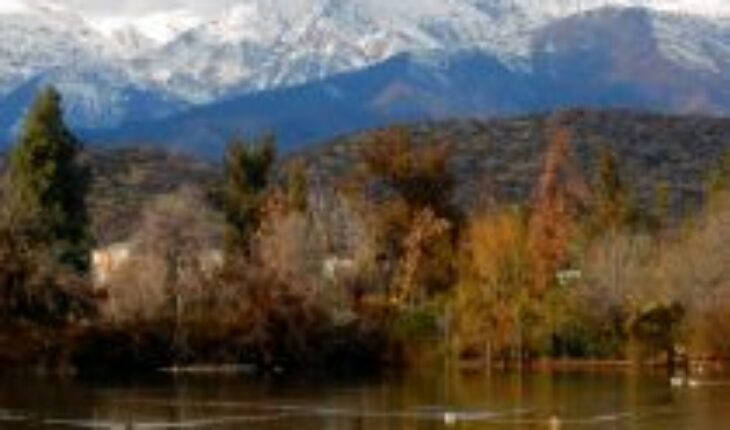The recent approval in plenary of the second report of the Committee on the Environment of the Constitutional Convention, marks a before and after in the constitutional history not only of Chile, but also of the region and the world, with regard to the incorporation of new rights
I propose it, since we will not only be the second country in the world, after Ecuador, to incorporate the Rights of Nature in a Constitution, but also to be pioneers in recognizing Animal Rights (not human) in the new Magna Carta, in the case of being approved in the exit plebiscite.
Hence, these norms approved by the Plenary are only the starting point of a broad process of global socio-ecological transition, of which Chile will have to lead internationally, through new legislation and biocentric policies, where respect, protection, regeneration and restoration of natural cycles, ecosystems and biodiversity, are the floor of the new Regional, Plurinational and Intercultural State.
Of course, like any transition, it will not be from one day to the next, but the new laws that will have to be approved in Chile and the life systems that seek to be promoted, will necessarily have to rethink what has been understood about the very idea of development, from the post-war period onwards, which has always been subordinated to a modern and capitalist delirium, as is infinite economic growth.
Of this critique of the discourse of development, much has been said and written worldwide about its dire consequences, as was evident in the Dictionary of Development (1992), highlighting what was raised by the recently deceased Gustavo Esteva, when he said that “there is nothing in the modern mindset that can be compared to it as a driving force of thought and behavior. At the same time, very few words are as tenuous, fragile, and incapable of giving substance and meaning to thought and action as this one.“.
Consequently, development has been part of a racist and colonizing discourse, heir to the Enlightenment notion of progress, which has served to divide and classify the world hierarchically, between developed and underdeveloped countries or first or third world, based on certain political, economic and social indicators.
Therefore, it will be of little use to have Rights of Nature as long as future rulers and legislators continue to talk about reductionist notions such as sustainable development, green economy and Smart City, and continue to see us as a country on the way to something that never comes, such as development, living in a completely unequal system and with centers of imperial power that make it impossible to democratize relations between countries.
Not to see that, is to continue conceiving in an anthropocentric and Eurocentric way the Rights of Nature, as mere environmental Human Rights of the third generation, which makes Nature one more dimension to work for States, as well as the environment, instead of being what sustains life in all its breadth and plurality.
In other words, we do not want the Rights of Nature to be recolonized by the discourse of development, creating only a specific governmental (ministerial) and legal (courts) institutionality, without touching an unsustainable economic model that depends almost exclusively on the so-called natural resources or raw materials.
Likewise, the Rights of Nature are not compatible with the linear, teleological, evolutionary and staged gaze to which we are ill accustomed to the different developmental strategies, which doctrinarily sell us a better world, both left and right, where a sustainable world for life is possible, together with the expansion of certain extractive businesses, both private and state.
For this reason, it is worrying that in the draft of the new Constitution that has been carried out so far, the notion of development appears repeatedly, but nowhere do alternative notions such as good living, agroecology, degrowth, food sovereignty, permaculture and many other alternatives to development appear, as they appear, for example, in the collective book Pluriverso. A Dictionary of Post-Development (2019).
It is also worrying that the draft does not mention anywhere that we are part of Latin America and the Caribbean, making it impossible to see the Rights of Nature beyond national borders and what has been raised by the original peoples.s in Chile, from a broader plurinationality of a regional nature.
While the inclusion of legal pluralism in the new Constitution of Chile is celebrated, there should also be economic, epistemic and ontological pluralism, since it is fundamental to decolonize, depatriarchalize and decommodify the relationship we have with Nature.
On the other hand, reviewing what was proposed in the Constitutional Convention, for the approval of the second report of the Committee on the Environment, it is striking that the most conservative sectors of the country have opposed the Rights of Nature, saying that, if approved, social rights cannot be financed due to lack of resources.
That is, it is not only striking that the neoliberal right now speaks of social rights, after so many years, but that it uses arguments identical to the so-called progressive governments of the region, as has happened in Bolivia and Ecuador, which have violated the Rights of Nature, appealing to the same developmentalist arguments to deepen extractivism.
That is why the nationalization of the natural commons, as some state-centric lefts still propose, is no better than their privatization, since both discourses are heirs of modern developmentalism, opposed to the Rights of Nature.
By this I do not mean that nature should not be touched or intervened by human beings, much less that we have to live as thousands of years ago, as some sectors seek to caricature, but understand that the economic models and life systems that are generated, must have certain limits and be compatible with the cycles of nature.
Not to see it like this, in the midst of the climate and civilizational crisis, is to literally live on another planet.
The content expressed in this opinion column is the sole responsibility of its author, and does not necessarily reflect the editorial line or position of El Mostrador.





